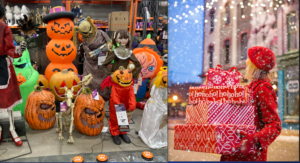Every Christmas, millions of people find themselves celebrating alone, with about 19 million Americans experiencing the holiday in solitude. This poignant reality is most significant in Oregon, where 45% of residents celebrate solo, while in Tennessee, only 12% face the same situation, reflecting the strength of local family bonds. Loneliness during the holidays can impact health, equating to the dangers of smoking 15 cigarettes daily. Yet, many find comfort in activities like online gaming, movie marathons, and hobbies. Engaging in community activities or personal traditions can transform a solitary Christmas into a meaningful day, filled with connection and joy.
Takeaways
- 19 million Americans are expected to spend Christmas alone.
- Oregon has the highest rate, with 45% of residents spending Christmas alone.
- Tennessee has the lowest rate, at 12%.
- In Indiana, 1 in 5 respondents will spend Christmas alone.
Survey Findings
The survey reveals that an estimated 19 million Americans are expected to spend Christmas alone this year, underscoring a significant issue of solitude during the holiday season. Spending Christmas alone can be challenging, especially when family gatherings are the norm for many. The data highlights a growing concern about social isolation, which can be particularly poignant during festive times meant to bring people together.
Interestingly, the survey shines a light on the kindness of those who do have family. A heartwarming 88% of respondents with family expressed that they would invite a neighbor who is alone to join them for Christmas. This generosity reveals the community spirit and the willingness to combat loneliness, one invitation at a time.
While some choose solitude, others might not have a choice due to various circumstances. Social isolation during such a celebratory time can impact mental well-being. Consequently, the act of inviting a neighbor could make a significant difference.
Family gatherings are not just about being with loved ones; they can also be an opportunity to extend a hand to those who might be spending Christmas alone. This small gesture can bring joy and warmth, making the holiday season brighter for all.
State-wise Disparity

Examining the state-wise disparity reveals significant differences in the rates of individuals spending Christmas alone across the United States. While some states see a higher percentage of their population facing solitude, others enjoy stronger family and community ties during the festive season.
For instance, in Oregon, a striking 45% of residents are expected to spend Christmas alone, making it the state with the highest rate of solitary celebrations. This stark contrast is partly due to various factors like the cost of living and demographic trends that influence social connections.
On the flip side, Tennessee boasts the lowest rate, with only 12% of its population likely to be alone during the holiday. This suggests stronger family bonds and a more community-oriented lifestyle.
Indiana presents an intriguing middle ground. A survey revealed that 1 in 5 respondents, or about 391,502 people, will find themselves without company on Christmas. This highlights the varied experiences across states, with some regions experiencing more significant challenges than others.
Understanding these disparities can shed light on the cultural and socio-economic factors that shape our holiday experiences. It underscores the importance of community and family in alleviating the loneliness that some may feel during Christmas.
Health Implications
Loneliness during Christmas isn’t just a sad feeling; it can actually harm your health, like smoking 15 cigarettes a day.
People who feel isolated are at a higher risk of heart disease and mental health issues like depression and anxiety.
Staying socially connected, especially over the holidays, is essential for maintaining both physical and mental well-being.
Loneliness and Heart Disease
Mounting evidence indicates a notable correlation between social isolation during the holiday season and an increased risk of heart disease. Loneliness, especially around festive times like Christmas, can greatly impact one’s health. Studies have shown that individuals who feel lonely are up to 30% more likely to develop heart disease. This statistic highlights the severe health risks associated with a lack of social connections.
When people are lonely, their stress levels often increase. This stress can cause inflammation in the body, leading to various health issues, including heart disease. It’s not just a temporary feeling; chronic loneliness can have long-lasting effects on the heart and overall health.
Furthermore, the health risks of loneliness are comparable to smoking 15 cigarettes a day, which is quite alarming!
But here’s the good news: maintaining strong social connections can help combat these health risks. Being around friends and family, even if only virtually, can improve heart health and contribute to a longer, healthier life.
Impact on Mental Health
The profound impact of social isolation during the holiday season extends beyond physical health, greatly affecting mental well-being.
Loneliness, especially during festive times like Christmas, can lead to a cascade of mental health issues. Research shows that chronic loneliness is linked to heightened risks of depression, anxiety, and even cognitive decline, such as dementia. The lack of social connections can amplify stress levels, contributing to inflammation and various health problems.
Understanding the mental health implications of social isolation, especially during Christmas, is vital. Here are three key points to keep in mind:
- Increased Risk of Depression and Anxiety: Loneliness can intensify feelings of sadness and worry, making it harder for individuals to enjoy life. The holidays, often seen as a time for togetherness, can exacerbate these feelings when spent alone.
- Chronic Stress and Health Issues: Social isolation can trigger chronic stress, which negatively impacts mental and physical health, leading to conditions like heart disease and stroke.
- Importance of Coping Strategies: To combat loneliness, effective coping strategies such as engaging in community activities, maintaining virtual connections, or seeking professional help are essential.
Addressing loneliness with proactive measures can greatly enhance mental health, especially during the holidays.
Coping Mechanisms

As many individuals face the prospect of spending Christmas alone, various coping mechanisms become essential for managing loneliness.
Online gaming has emerged as a popular choice, offering a sense of community and interaction, while movie marathons provide a comforting escape.
Additionally, engaging in hobbies like knitting or cooking can transform solitary moments into opportunities for creative fulfillment.
Online Gaming Popularity
Online gaming has emerged as a significant coping mechanism for individuals spending Christmas alone, offering both social interaction and entertainment. For many, this activity serves as a crucial social outlet, helping to alleviate the sense of loneliness that can accompany the holiday season. According to a survey, 26% of respondents planning to spend Christmas alone intend to turn to online gaming, underscoring its popularity.
Here are three key ways online gaming helps:
- Sense of Community: Multiplayer and cooperative games allow players to connect with friends or meet new people. This interaction can create a sense of belonging, even when physically isolated.
- Distraction and Engagement: Immersive gameplay provides an entertaining distraction from the emotional challenges of spending the holidays alone.
- Virtual Connections: The rise of digital socialization means more people are seeking virtual connections during festive periods, making online gaming a practical and enjoyable option.
This growing trend reflects a broader shift towards digital means of social interaction. As more individuals find solace in these virtual communities, online gaming continues to provide a meaningful and engaging way to celebrate the holiday season, even when alone.
Movie Marathons Effectiveness
Binge-watching movies has become an increasingly popular coping mechanism for individuals dealing with loneliness during the Christmas season. With 19% of people planning to engage in movie marathons, this activity offers a comforting escape from solitude. The magic of immersing oneself in fictional worlds provides a temporary distraction, making the festive season feel a bit less lonely.
During these movie marathons, people can connect with stories and characters, which can help alleviate feelings of isolation. There’s something heartwarming about watching a beloved film and feeling the emotions of characters who become like friends. This sense of connection is particularly valuable during the festive season when loneliness can be more pronounced.
Moreover, engaging in movie marathons can serve as a form of self-care. Cozying up with a favorite film allows individuals to relax and enjoy some quality ‘me time’ in a soothing environment. The therapeutic value of movies cannot be underestimated, as they offer not just entertainment but also a way to combat loneliness and enhance mental well-being.
Finding enjoyable activities like this is essential, especially during the holidays, to guarantee that everyone can find some joy and comfort, even when alone.
Engaging in Hobbies
Engaging in hobbies during the Christmas season serves as a constructive coping mechanism for approximately 15% of individuals spending the holiday alone, offering a productive outlet that promotes mental well-being and creativity.
When loneliness creeps in, diving into personal interests can make a significant difference. Whether it’s crafting, gardening, or painting, hobbies not only provide distraction but also foster a sense of accomplishment and fulfillment.
Imagine the joy of completing a handmade scarf or seeing a garden bloom despite the winter chill. Engaging in such activities can lift spirits and add a splash of color to the festive season.
Here are three popular hobbies that solitary celebrants often find enriching:
- Crafting: Making holiday decorations or gifts can be a deeply rewarding experience. It channels creativity and results in something tangible to cherish.
- Gardening: Tending to plants, even during winter, can be a soothing and grounding activity, connecting individuals with nature.
- Painting: Expressing emotions through colors and brushes can be incredibly therapeutic, allowing for personal reflection and artistic growth.
Challenging Days

The holiday season presents numerous challenging days for those who find themselves alone, with Christmas Day being the most difficult for 42% of individuals. This day, usually filled with family gatherings and festive cheer, can feel particularly isolating when spent alone.
The sense of solitude is further compounded on New Year’s Eve, a night typically celebrated with friends and loved ones, with 11% of people finding it challenging to ring in the new year alone.
Interestingly, personal birthdays follow closely behind Christmas Day, with 22% of individuals finding it hard to celebrate alone on their special day. Birthdays are often seen as a time for personal acknowledgment and joy, making the absence of companionship especially poignant.
Christmas Eve, mirroring the sentiments of New Year’s Eve, also proves challenging for 11% of those in solitude.
Thanksgiving, a day centered around gratitude and togetherness, is another notable day of difficulty, with 10% of respondents citing it as hard to spend alone.
Though less emphasized, Easter Sunday is reported as the least challenging holiday to spend alone, with only 2% indicating it as difficult.
These statistics highlight the emotional complexities faced by those maneuvering the holiday season in solitude.
Community Spirit

Amid the challenging days of the holiday season, community spirit emerges as a beacon of hope and connection for those spending Christmas alone. The sense of community and inclusivity becomes particularly essential during this time, offering social support to individuals who might otherwise feel isolated.
A recent survey reveals that an overwhelming 88% of people surrounded by family are willing to invite a neighbor spending Christmas alone to join their celebrations. This simple act of kindness exemplifies the essence of community spirit, fostering connections that can alleviate the mental health impacts of social isolation. As many as 19 million Americans are expected to spend Christmas alone, but the community’s recognition of inclusivity helps bridge this gap.
Here are three ways community spirit can make a difference:
- Invite a Neighbor: Extending an invitation to someone spending alone can transform their holiday experience, making them feel valued and included.
- Volunteer for Charities: Engaging in local charitable activities on Christmas Day not only supports those in need but also enriches one’s own sense of community.
- Engage in Neighborly Kindness: Simple gestures like sharing holiday treats or offering a friendly chat can greatly boost someone’s spirits.
These initiatives underscore the importance of social support and demonstrate how community spirit can brighten the holiday season for everyone.
Personal Traditions

How can individuals spending Christmas alone find joy and fulfillment through personal traditions tailored to their interests? Many people who find themselves alone this year can still turn the holiday into a wonderful time by creating personal traditions. These unique customs cater to what they love, making the day special and meaningful.
One way to start is by setting a flexible schedule filled with favorite activities. Cooking a special meal, diving into a beloved hobby, or watching a cherished movie can all enhance the joy of spending the day solo. With almost 40% of Australians reporting no religious affiliation, it’s clear that many are redefining their holiday experiences. Embracing personal traditions outside of conventional norms is becoming more common.
Solitude can be a golden opportunity for self-discovery. New customs, like early morning hikes or self-care pampering sessions, can bring fulfillment and joy. Focusing on activities that promote happiness and relaxation transforms the experience of being alone this year into something positive.
Ultimately, personal traditions help individuals find joy and fulfillment during the holiday season. They turn solitude from a challenge into a chance for growth, making Christmas a truly wonderful time.
Frequently Asked Questions
Do a Lot of People Spend Christmas Alone?
Yes, a significant number of people spend Christmas alone. This year, around 19 million Americans are expected to experience solitude on Christmas, with varying rates across states such as Oregon and Tennessee highlighting this growing trend.
Is It Normal to Be Alone on Christmas?
Spending Christmas alone is increasingly common, influenced by rising single-person households and shifting social dynamics. Normalizing diverse holiday experiences can help mitigate the associated feelings of isolation, promoting broader acceptance and understanding.
How Many Old People Spend Christmas Alone?
Approximately 19 million Americans, including a significant number of seniors, will spend Christmas alone this year. This is reflective of broader social trends, with one in four seniors reporting they will not see their families over the holidays.
How Much Do People Spend on Christmas per Person?
The average American plans to spend approximately $932 on Christmas gifts and celebrations in 2023, with around $600 dedicated to gifts for family and friends. Additionally, 40% of consumers are prioritizing experiences over traditional gifts.
Conclusion
Despite the festive season, many individuals find themselves spending Christmas alone, influenced by factors like location and personal circumstances.
The impact on mental and physical health is significant, but various coping mechanisms and community efforts offer support.
Traditions and personal resilience play essential roles in steering through this challenging period.
Understanding these dynamics fosters empathy and encourages inclusive community spirit, ensuring no one feels isolated during the holiday season.
Embracing diverse experiences enriches the collective celebration of Christmas.













